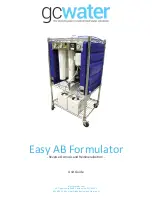
WT.025.000.001.UA.IM.0614
PAGE 15
CHLORINE HANDLING MANUAL
EVOQUA
W3T98244
The person responsible for making any of the calls listed
above must be sure to give the agency contacted complete
details including facility name, address, telephone number,
and the names(s) of personnel to contact for further informa-
tion. The description of the emergency should include size
of container, corrective action already taken, local weather
conditions, injuries, proximity to populated areas, and direc-
tions for easiest access to the site.
It is vital that the emergency plan include use of the “buddy
system”, i.e., no personnel should be allowed to work alone
in an area with a chlorine leak even if the second person
is only standing by. As indicated earlier, all personnel not
involved in locating and correcting the leak should leave
the area travelling in a crosswind direction to an area that
is upwind and above the leak. Since it may not be possible
for all personnel to be equipped with respiratory equipment,
they should be instructed to use a wet cloth or handkerchief
over the nose and mouth while leaving the area.
Chlorine Institute Pamphlet 64, Emergency Control Planning
Checklist for Chlorine Facilities, may be of assistance in pre-
paring the emergency plan. A Material Safety Data Sheet for
Chlorine, available from the Institute or the supplier, should
also be consulted.
No emergency plan should be implemented until it is reviewed
by the chlorine supplier and the agency in the community
having responsibility for hazardous material handling and
disposal.
If it is apparent that fire will threaten or is present in a chlo-
rine storage area, it is preferable to remove the containers.
If this is not possible, the containers must be protected
from the heat of the fire by spraying them with water. Do
not spray water on any leaking container, however, since
water will react with the chlorine, forming acids that will
make the leak worse.
5.5 CHEMICAL DISPOSAL FACILITIES
Part of the planning for emergencies entails provision for
disposal of any released chlorine. In most cases little can be
done about the chlorine already released to the atmosphere
except to try to prevent its dissipation into areas where dam-
age to equipment and personnel will result.
At some large installations, scrubbers have been installed
so that areas containing chlorine or chlorine equipment
can be sealed off and the air removed to a process that will
absorb the chlorine. The design of such a system is complex
and should only be attempted by those thoroughly familiar
with the process.
Absorption systems have been provided at some facilities
to permit a leaking container to be emptied quickly if this is
deemed essential. One pound of chlorine can be absorbed by
1. 4 pounds of sodium hydroxide (caustic soda), 3.7 pounds
of sodium carbonate (soda ash), or 1.3 pounds of calcium
hydroxide (hydrated lime).
WARNING: TO AVOID SEVERE PERSONAL INJURY WHEN
USING CORROSIVE CHEMICALS, OBSERVE ALL SAFETY
PRECAUTIONS RECOMMENDED BY THE CHEMICAL
MANUFACTURER/ SUPPLIER.
In each case, one pound of the material should be dissolved
in one gallon of water. Lime will actually be suspended in,
rather than dissolved in, the water and requires constant
agitation.
The tank and other equipment provided for an absorption
system must be fabricated of materials suitable for the
chemicals involved.
Provision must be made for dissolving the chlorine in the
alkaline solution in such a way that the solution cannot be
sucked back into the container.
Actually the safest way of disposing of the chlorine in the
leaking container might be through the chlorination process,
particularly if the process can absorb the chlorine at higher
than normal rates without creating damage.
It is not generally permissible to ship a container damaged
by leak or fire if it contains chlorine. If for some reason this
seems necessary, the chlorine supplier must be contacted.
Summary of Contents for Wallace & Tiernan V-2000 Series
Page 11: ...EVOQUA W3T110693 WT 025 055 002 UA IM 0814 MANUAL CHLORINATOR 500lb 24hr...
Page 12: ......
Page 17: ......
Page 26: ......
Page 32: ...WT 025 055 002 UA IM 0814 MANUAL CHLORINATOR 500lb 24hr 18 EVOQUA W3T110693...
Page 33: ......
Page 60: ......
Page 91: ......
Page 93: ......
Page 94: ...CHLORINE HANDLING MANUAL Cl2 BOOK NO WT 025 000 001 UA IM 0614 W3T98244...

































